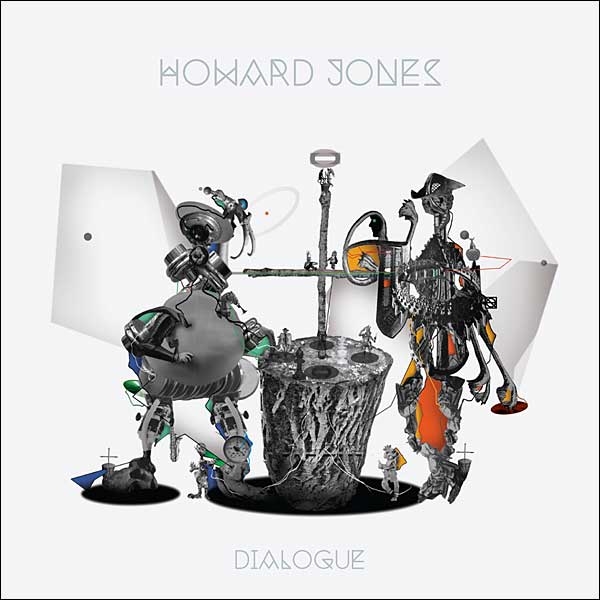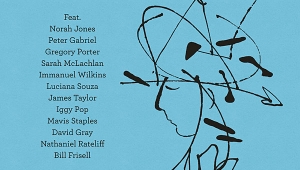| Columns Retired Columns & Blogs |
Recording of October 2022: Dialogue

Howard Jones: Dialogue
D-Tox Records (Multiple formats; auditioned as 16/44.1 stream). 2022. Howard Jones, prod.; Robbie Bronnimann, eng.
Performance ****½
Sonics ****½
D-Tox Records (Multiple formats; auditioned as 16/44.1 stream). 2022. Howard Jones, prod.; Robbie Bronnimann, eng.
Performance ****½
Sonics ****½
Howard Jones has always come across as an endearing blend of mad scientist and hopeless romantic. Since his 1983 debut single, "New Song," he has blended obsessive technical detail with extreme emotionality. His newest album, Dialogue, is the latest example of this approach, in which intricate structures of synthesized sound grow into musical mountains supporting impassioned lyrics.
Dialogue is the third album in what Jones, 67, conceived as a trilogy. While sonically interesting, 2019's Transform had lackluster sonics compared with the spectacular Engage from 2015, which was as inventive as it was beautifully produced. (Particularly recommended: the choral layers of "The Walk" and the Hanon-meets-Moog playfulness of "5 Pianos.") Now, Jones is back on his game; this third album recaptures the vibrant energy and scintillating sound of the trilogy's first installment.
More than just a songwriter, Jones is a skilled composer. When he's at his best, his arrangements are integral to his songs, of a piece with their underlying concept. A good example is the bass melody that opens "Formed by the Stars" and then becomes contrapuntal against the vocal melody; that 400-year-old compositional technique (counterpoint) isn't used often enough in pop music. A top-flight synth programmer, Jones stands out both for the range of sounds he creates and for his astonishing rhythmic dexterity; the acrobatic recorder-like riffs are especially fun on "Formed by the Stars."
Soul music has been an important influence on Jones's work for his whole career. "Celebrate It Together" has an electro-soul vibe at its center while employing many techniques at once, from funk to 8-bit. But while the 8-bit movement in indie rock, which was meant to evoke retro video games, can be painfully garish, Jones's sonic brush deploys mere dabs of cascading blips, apportioning them appropriately into the song's orchestration.
Despite the excitement of contrasting textures that, on "My One True Love," clash like silk cushions against tiger's claws, this song is a rare case of Jones being unconvincing. He says the song was inspired by a lockdown nightmare about losing the love of his life. (He's been married to Jan Smith since 1977.) Yet, the arrangement comes across as calculated, which isn't typical for Jones. It feels less like a nightmare than an intellectual parsing of what such a loss should feel like.
But some of these songs do have Jones's signature power. He is at his best when there's a shade of anger alongside a warning that living right is hard but worth it. Examples are peppered all through his work, from "Look Mama" and "Pearl in the Shell" in the 1980s to 2005's "I've Said Too Much" and "Another Chance" from Revolution of the Heart. On the new album, this philosophy manifests on "Who You Really Want to Be," which demands that listeners take responsibility for their lives, that tough-love message glazed with Robbie Williams–like dance energy.
Jones's frustration with society never lasts long; it's soon counteracted by a glorious optimism that's preposterous yet hard to resist. This has been true since the world fell in love with such bouncy early hits as "New Song," "Like to Get to Know You Well," and "Things Can Only Get Better." The pandemic lockdown caused this element to reemerge, particularly in "I Believe in You." "I wanted to put out a message of encouragement," Jones has written about the song. "I believe in you and your amazing potential!" Rather than slathering on gooey platitudes, this track channels Peter Gabriel with a funky drive that encourages strength of spirit. Even the nightingale call at the end, recorded in Jones's backyard, avoids being overly sweet.
As a singer, Jones has more skill than he gets credit for. His natural baritenor is enhanced by a gentle, clear falsetto that he has impressive control over. Each verse of the song "Be the Hero" ends with a leap upward of a minor tenth, and he lands that huge interval perfectly every time, without over-singing. He also has excellent (uncorrected) intonation even in the trickiest passages. More than on earlier albums, Jones indulges in satisfyingly weird tonal and harmonic experimentation. "You Are the Peacemaker" seems to break out of its key every few bars; he sings his way through the maze without taking a wrong turn, even adding vocal harmonies to make a contrasting, diffuse timbre in the chorus.
Vocal layering and distortion are essential elements in "To Feel Love," another analysis of social behavior that contrasts how things are with how they could be. It's not entirely clear who is being discussed in the lyrics—kids who feel the need to join a gang, perhaps. To show the trap that these people are in, Jones uses relentless, insect-like blips and cuts up his voice electronically, creating a sort of sonic cubism.
Although the tour in support of Dialogue includes a band of Jones's usual cohorts, like guitarist Robin Boult and keyboardist Robbie Bronnimann (who mixed the tracks and assisted with the programming), the album is essentially a solo project. The pandemic lockdown forced many musicians to explore their art in new ways. Despite the distress of prolonged isolation, there seems to be a strong element of business as usual. However dark the times may seem, things can only get better.—Anne E. Johnson
- Log in or register to post comments




































